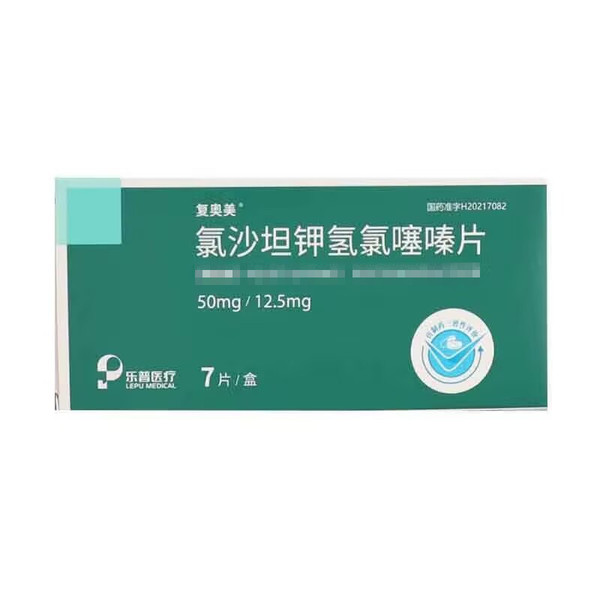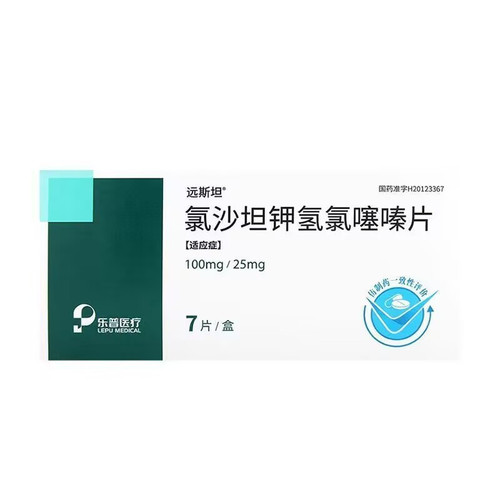Product Overview
[Drug Name]
Generic Name: Losartan Potassium and Hydrochlorothiazide Tablets
Trade Name: FuAoMei Losartan Potassium and Hydrochlorothiazide Tablets 50mg: 12.5mg*7 tablets
Pinyin Full Code: FuAoMei LvShaTanJiaQingLvZuoZuoPian 50mg: 12.5mg*7 tablets
[Main Ingredients]
This product is a combination preparation. Each tablet contains 50mg of losartan potassium and 12.5mg of hydrochlorothiazide.
[Properties]
This product is a yellow, oval film-coated tablet that appears white after removal of the coating.
[Indications/Main Functions]
This product is used to treat hypertension and is suitable for patients receiving combination medications.
[Precautions]
Losartan-Hydrochlorothiazide Embryotoxicity: Use of drugs that affect the renin-angiotensin system during the second and third trimesters of pregnancy can reduce fetal renal function and increase fetal and neonatal morbidity and mortality. Resulting oligohydramnios may be associated with fetal lung hypoplasia and skeletal deformities. Potential neonatal adverse reactions include cranial hypoplasia, anuria, hypotension, renal failure, and death. Upon discovery of pregnancy, discontinue this drug as soon as possible. See [Use in Pregnant and Lactating Women]. Hypersensitivity reaction: Angioedema. (See [Adverse Reactions]). Hepatic and Renal Impairment: This drug is not recommended for use in patients with hepatic impairment or severe renal impairment (creatinine clearance ≤ 30 mL/min) (see [Dosage and Administration]). Losartan: Renal Insufficiency: Inhibition of the renin-angiotensin system can lead to changes in renal function. Renal failure has been reported in susceptible patients (particularly in patients with conditions where renal function depends on the renin-angiotensin-aldosterone system, such as those with severe cardiac insufficiency or renal abnormalities). In some patients, changes in renal function are reversible after discontinuation of treatment. Anemia has been reported in some patients with severe renal disease or renal transplant recipients treated with losartan potassium. In patients with bilateral or unilateral renal artery stenosis, or renal artery stenosis of a single kidney, use of other drugs that affect the renin-angiotensin system can cause increases in plasma urea and creatinine; similar effects have been reported with losartan. These changes in renal function are reversible upon discontinuation of the drug. Increased serum potassium: Concomitant use with other drugs that may increase serum potassium may result in hyperkalemia (see [Drug Interactions]). Hydrochlorothiazide: Hypotension and Electrolyte Imbalance: As with all antihypertensive therapies, some patients may experience symptomatic hypotension. In the event of concurrent diarrhea or vomiting, patients should be observed for clinical signs of fluid or electrolyte imbalance, such as volume depletion, hyponatremia, hypochloremic alkalosis, hypomagnesemia, or hypokalemia. Serum electrolytes should be monitored regularly. Metabolic and Endocrine Effects: Thiazide therapy can impair glucose tolerance. Adjustments in the dose of antidiabetic medications, including insulin, may be necessary (see [Drug Interactions]). Thiazides can decrease urinary calcium excretion and cause intermittent mild increases in serum calcium. Significant hypercalcemia may be a manifestation of occult hyperparathyroidism. Therefore, thiazide therapy should be discontinued before parathyroid function testing. Elevated cholesterol and triglycerides may be related to thiazide diuretic therapy. Thiazide therapy may precipitate hyperuricemia and/or gout in some patients. Because losartan lowers uric acid, the combined use of losartan potassium and hydrochlorothiazide may mitigate diuretic-induced hyperuricemia. Non-melanoma skin cancer: Epidemiological studies have shown an increased risk of non-melanoma skin cancer (basal cell carcinoma [BCC] and squamous cell carcinoma [SCC]) with increasing cumulative hydrochlorothiazide doses. The photosensitizing effect of hydrochlorothiazide may be a pathogenic mechanism for non-melanoma skin cancer. Patients taking hydrochlorothiazide should be informed of the risk of non-melanoma skin cancer and advised to take precautions to reduce exposure to sunlight and artificial ultraviolet light. Patients should regularly examine their skin for new lesions and promptly report suspicious skin lesions to their physician for evaluation. For patients with a history of non-melanoma skin cancer, the use of hydrochlorothiazide may need to be reconsidered (see Adverse Reactions). Other: Allergic reactions may occur with thiazide use, regardless of a history of allergies or bronchial asthma. Cases of systemic lupus erythematosus exacerbated or precipitated by thiazide use have been reported. Anti-doping Control: This product contains hydrochlorothiazide, which can cause positive anti-doping control test results. Athletes should use this product with caution.
[Drug Interactions]
- Patients with hypersensitivity to any component of this product. - Patients with anuria. - Patients with hypersensitivity to other sulfonamides. - Patients with diabetes should not use this product concomitantly with aliskiren (see Drug Interactions).
[Specifications]
50 mg: 12.5 mg x 7 tablets
[Dosage and Administration]
The typical starting and maintenance dose of this product is one losartan potassium hydrochlorothiazide tablet (50 mg + 12.5 mg) once daily. For patients with an inadequate response, the dose can be adjusted to one losartan potassium hydrochlorothiazide tablet (100mg + 12.5mg) once daily. If necessary, the dose can be increased to two losartan potassium hydrochlorothiazide tablets (50mg + 12.5mg) or one losartan potassium hydrochlorothiazide tablet (100mg + 25mg) once daily. This dose is the maximum daily dose. Antihypertensive effects are generally achieved within three weeks of starting treatment. This drug should not be used in patients with volume depletion (such as those taking high-dose diuretics). It is not recommended for patients with severe renal insufficiency (creatinine clearance ≤ 30mL/min) or hepatic insufficiency. For elderly hypertensive patients, the starting dose does not require adjustment, but losartan potassium hydrochlorothiazide tablets (100mg + 25mg) should not be used as initial treatment. This drug can be taken in combination with other antihypertensive medications. It can be taken with or without food.
[Adverse Reactions]
No adverse reactions specific to losartan potassium-hydrochlorothiazide were observed in clinical trials of this combination. These adverse reactions were limited to previously reported adverse reactions with losartan potassium and/or hydrochlorothiazide. The overall incidence of adverse reactions with this combination was similar to that with placebo. The percentage of treatment discontinuations was also similar to that with placebo. Losartan potassium-hydrochlorothiazide was generally well tolerated. The vast majority of adverse reactions were mild and transient, not requiring treatment interruption. In controlled clinical trials of losartan potassium-hydrochlorothiazide for the treatment of essential hypertension, dizziness was the only adverse reaction reported as drug-related with an incidence greater than 1% and greater than placebo. In controlled clinical trials of hypertensive patients with left ventricular hypertrophy, losartan (usually in combination with hydrochlorothiazide) was well tolerated. The most common drug-related adverse reactions were dizziness, weakness/fatigue, and vertigo. Other adverse reactions reported with postmarketing use of this product and/or with losartan and hydrochlorothiazide alone in clinical trials or postmarketing use are as follows: Blood and Lymphatic System Disorders: Thrombocytopenia, anemia, aplastic anemia, hemolytic anemia, leukopenia, agranulocytosis. Immune System Disorders: Angioedema (including laryngeal and glottic edema leading to airway obstruction and/or swelling of the face, lips, pharynx, and/or tongue) has been reported rarely in patients treated with losartan; some of these patients have previously experienced angioedema with other medications (e.g., ACE inhibitors). Metabolic and Nutritional Disorders: Anorexia, hyperglycemia, hyperuricemia, and electrolyte imbalances including hyponatremia and hypokalemia. Psychiatric Disorders: Insomnia, restlessness. Neurological Disorders: Dysgeusia, headache, migraine, paresthesia. Ocular Disorders: Xanthophthalmia, transient blurred vision. Cardiac Disorders: Palpitations, tachycardia. Vascular Disorders: Dose-related postural hypotension, necrotizing vasculitis (angiitis) (cutaneous vasculitis). Gastrointestinal Disorders: Dyspepsia, abdominal pain, gastrointestinal irritation, cramps, diarrhea, constipation, nausea, vomiting, pancreatitis, sialadenitis. Respiratory, Thoracic, and Mediastinal Disorders: Cough, nasal congestion, pharyngitis, sinus disorders, upper respiratory tract infection, respiratory distress (including pneumonia and pulmonary edema). Hepatobiliary Disorders: Hepatitis, jaundice (intrahepatic bile accumulation). Skin and Subcutaneous Tissue Disorders: Rash, pruritus, purpura (including Henoch-Schönlein purpura), toxic epidermal necrolysis, urticaria, erythroderma, photosensitivity, cutaneous lupus erythematosus. Musculoskeletal and Connective Tissue Disorders: Back pain, muscle cramps, muscle spasms, myalgia, arthralgia. Renal and Urinary Disorders: Diabetes mellitus, renal dysfunction, interstitial nephritis, renal failure. Reproductive System and Breast Disorders: Erectile dysfunction/impotence. General Discomfort and Administration Site Abnormalities: Chest pain, edema/swelling, malaise, fever, asthenia. Investigational: Abnormal liver function. Laboratory Findings: In controlled clinical trials, clinically important changes in standard laboratory values were rarely associated with the use of this product. Hyperkalemia (serum potassium > 505 mEq/L) occurred in 0.7% of patients, but in these trials, discontinuation of this product was not necessary. Elevated ALT levels rarely occurred and generally resolved after discontinuation of this product.
[Contraindications]
- Patients with hypersensitivity to any component of this product. - Patients with anuria. - Patients with hypersensitivity to other sulfonamides. - Patients with diabetes should not use this product concomitantly with aliskiren (see Drug Interactions).






